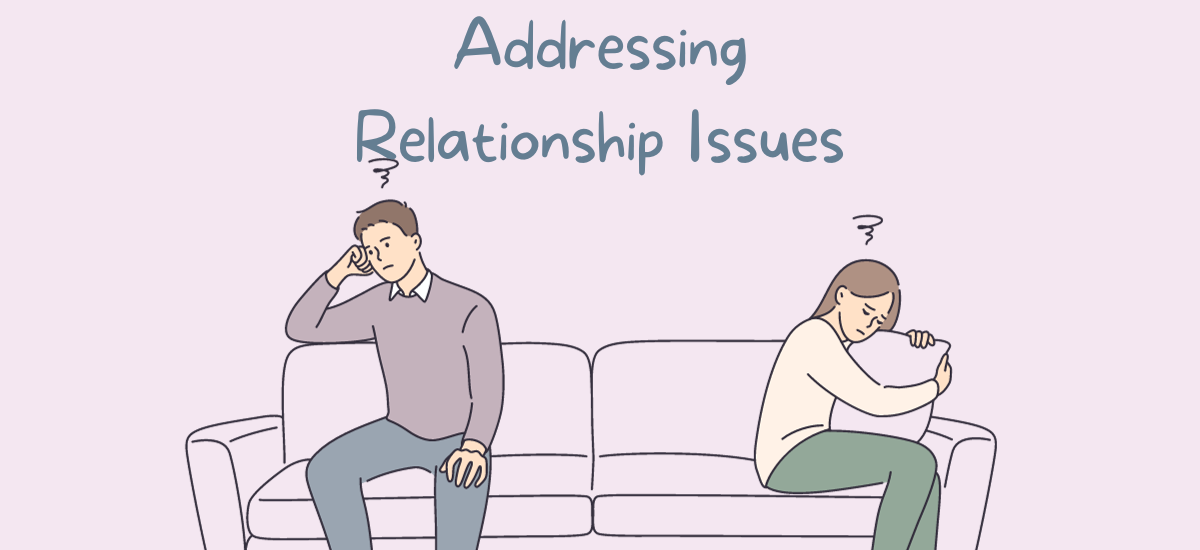Addressing Relationship Issues: Causes, Symptoms & Treatment

Introduction:
Relationship problems refer to any difficulties or conflicts that arise within the dynamics of a romantic or interpersonal relationship. These can include issues with communication, trust, intimacy, commitment, or compatibility. Relationship problems can manifest in various forms, such as emotional distance, arguments, resentment, or dissatisfaction. They can also range in severity, from minor disagreements to major crises that threaten the stability and well-being of the relationship.
Causes:
- Lack of communication: Poor communication is often cited as one of the main causes of relationship problems. When partners are not able to effectively communicate with one another, it can lead to misunderstandings, misinterpretations, and feelings of disconnection.
- Trust issues: Trust is a crucial aspect of any relationship, and a lack of trust can cause major problems. Trust issues can stem from past betrayals, jealousy, or a lack of transparency in the relationship.
- Financial stress: Money problems can put a significant strain on a relationship. Whether it’s due to a lack of financial resources or disagreements about spending habits, financial stress can lead to arguments and resentment.
- Infidelity: Cheating is one of the most destructive things that can happen in a relationship. It can cause feelings of betrayal, anger, and hurt, and can be difficult to recover from.
- Different priorities: When partners have different priorities and goals, it can be difficult to find common ground. This can lead to disagreements and a lack of understanding, which can cause problems in the relationship.
- Lack of intimacy: A lack of physical or emotional intimacy can make a relationship feel distant and unfulfilling. This can be caused by a variety of factors, such as busy schedules, stress, or a lack of emotional connection.
- Past traumas: Past traumas and experiences can have a significant impact on a person’s ability to form healthy relationships. Trauma can cause trust issues, emotional distance, and a lack of intimacy.
- Lack of shared values: When partners have fundamentally different values and beliefs, it can be difficult to maintain a healthy relationship. This can lead to disagreements and a lack of understanding, which can cause problems in the relationship.
Symptoms of Relationship problem
- Lack of communication: Difficulty in expressing thoughts, feelings, and concerns to your partner or lack of response from them.
- Trust issues: Suspicion, jealousy, and mistrust in the relationship.
- Lack of intimacy: Feeling emotionally or physically disconnected from your partner.
- Constant fighting: Constant arguing, bickering, and disagreements.
- Emotional distance: Feeling emotionally detached from your partner, feeling like you are living separate lives.
- Avoiding each other: Avoid spending time together, and avoiding physical or emotional intimacy.
- Resentment: Holding grudges, feeling angry, or bitter towards your partner.
- Lack of support: Feeling unsupported or unimportant in the relationship.
- Financial stress: Financial disagreements or stress causing strain on the relationship.
- Infidelity: Cheating or a lack of loyalty in the relationship.
Treatment of Relationship problem
Treatment for relationship problems can vary depending on the specific issues at hand. Some common forms of treatment include:
- Couples therapy: This is a form of therapy where both partners meet with a therapist to discuss and work through any issues in their relationship.
- Individual therapy: If one partner is not willing to participate in couples therapy, the other partner may seek individual therapy to work through their own feelings and concerns related to the relationship.
- Medication: In some cases, medication may be prescribed to help with issues such as depression or anxiety that may be contributing to relationship problems.
- Communication Skills Training: learning effective communication skills can help couples to understand and express their needs, wants, and feelings, which can lead to better understanding and less conflict.
- Relationship Education: learning skills related to conflict resolution, problem-solving, and building intimacy can help couples to strengthen and improve their relationships.
- Mindfulness-based therapies: Mindfulness-based therapies such as mindfulness-based cognitive therapy (MBCT) and mindfulness-based stress reduction (MBSR) can help couples to manage stress and improve emotional regulation, which can lead to improved communication and problem-solving.
It is important to note that treatment for relationship problems should be tailored to the specific needs of the couple, and may involve a combination of different approaches.
Conclusion
In conclusion, relationship problems can be challenging and difficult to navigate. However, with the right mindset and approach, it is possible to overcome these issues and strengthen your relationship. Communication, empathy, and a willingness to compromise are key ingredients for a healthy relationship. Additionally, seeking professional help can provide valuable guidance and support. Remember, relationships take work and effort, but the rewards of a healthy and loving partnership are worth it.
Related Articles

Letting Go With Grace: Emotional Tools for Closure
Letting go is never easy. Whether we are parting ways with a loved one, ending a relationship, leaving a job, or saying goodbye to a cherished chapter of life, the emotional weight can feel overwhelming. Yet, closure is essential for our emotional well-being. Without it, we carry unresolved grief, anger, regret, or longing that can seep into new relationships and experiences, holding us back from healing and growth.

Breakup Blues: How to Cope and Rebuild Your Self-Worth
A breakup often feels like a silent earthquake—unseen by others but devastating within. The pain doesn’t just come from the loss of a relationship, but from the crumbling of the life, identity, and future you built with another person. You may find yourself questioning your worth, doubting your value, and feeling isolated even when surrounded by people. In Indian society, where emotional expression is often discouraged and breakups can be stigmatized, this pain may feel even more overwhelming. But the truth is—while breakups may shake you, they do not define you. You are not broken; you are in a process of emotional reformation. And with the right tools, guidance, and support system, you can rebuild not just your self-worth but also your entire life narrative.

Healing After Heartbreak: A Mental Health Perspective
Heartbreak doesn't just break your heart—it can shatter your sense of identity, peace, and purpose. Whether the end was expected or abrupt, mutual or one-sided, short-lived or long-term, the aftermath often leaves people emotionally disoriented. In Indian culture, where societal expectations and family involvement in romantic relationships are prevalent, the pain is not just personal—it is public. Yet, very few are taught how to heal from emotional loss in a healthy, sustainable way.

Boundaries in Love: Saying ‘No’ Without Guilt
Love, in its truest form, should be a safe space—a space where individuality is not only respected but celebrated. Yet, in many relationships, especially in the Indian cultural context, love is often misunderstood as constant availability, complete sacrifice, and putting the other person first, always. As noble as this may sound, this version of love often leads to emotional exhaustion, suppressed resentment, and the erosion of one’s identity.

Gaslighting in Relationships: What It Is and How to Heal
Gaslighting is a form of emotional abuse that erodes your ability to trust your own perception. It’s a slow, insidious process that often begins with subtle doubts and ends with complete self-questioning. In romantic relationships—especially in the Indian context where silence, compromise, and duty are often mistaken for love—gaslighting can be even harder to recognize.

How Depression Can Affect Your Relationship—And What You Can Do
Depression is not just an internal struggle—it ripples outward, affecting relationships, routines, and the emotional fabric that holds people together. When someone is dealing with depression, it's not only their world that becomes dim—it can cast a shadow over their most intimate connections too. In a country like India, where open conversations about mental health are still rare and love is often equated with endurance, depression within a relationship can become invisible, misunderstood, or misjudged.
